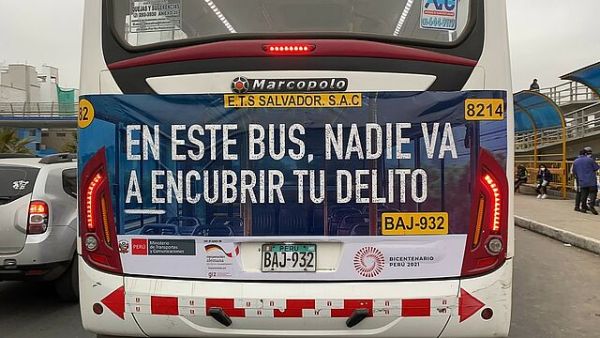NAMA Support Project Assists Ministry of Transportation & Communications in Creating Safer Public Transport in Peru

Image Caption: Branded buses as part of Peru’s national campaign on public transportation safety contain the slogan, “In this bus, no one will cover your crime”, aimed at discouraging aggressors of sexual harassment, a punishable crime.
#NoVaSola: Men and Women Against Harassment in Public Transport
Since 2018, the Peruvian Ministry for Transport and Communications (MTC) has made a nation-wide effort to address the safety of passengers in all ground transport services available. MTC’s efforts to improve safety on public transport are facilitated through the NAMA Support Project (NSP) for the Sustainable Urban Transport – NAMA TRANSPerú. Improving public safety aligns with the NSP’s goals of promoting key structural changes to transform the urban transport sector to be sustainable, low carbon and high quality for all. The NSP is funded by two NAMA Facility Donors, The Federal Ministry of the Environment, Nature Conservation and Nuclear Safety (BMU) and the Department for Business, Energy and Industrial Strategy (BEIS) from the United Kingdom and is implemented by the Deutsche Gesellschaft für Internationale Zusammenarbeit (GIZ) GmbH.
Early in 2018, with the technical assistance of the NSP, MTC carried out an initial field investigation to gain in-depth knowledge of women’s experiences on public transport in Lima and Callao. The study emphasised the issue of harassment of women, children and teenagers and is considered a milestone, as it marked the first time the public transport sector has produced sex-disaggregated data on gender-related violence. The study revealed critical information on the safety of women and men, namely that seven out of ten women reported having been a victim of harassment on public transport at some point in their lives. Of these women, 73% were between the ages of 13 and 18 at the first instance of harassment.
With this startling information and the NSP’s foundational support, MTC took the lead to develop and implement measures to discourage and prevent sexual harassment in public transportation services. To address this issue, MTC has worked in close coordination with the Ministry of Women Affairs and Vulnerable Populations (MIMP). As a result, in December 2020, a national response protocol on sexual harassment in public transport was approved to guarantee secure travelling conditions for users of public transport, as well as to provide adequate attention to harassment victims on these vehicles. Alongside the proposal’s development, the protocol was validated and agreed upon through participatory workshops in the three most populous cities in the north, centre and south of the country: Trujillo, Lima and Arequipa.
With the support of the NSP and the “Sustainable Urban Transport in Intermediate Cities – DKTI” Project of the German cooperation for development, implemented by GIZ, during 2021, the protocol has been implemented as a pilot in Lima and Trujillo. The latter is a northern Peruvian city in which six out of ten women report having been victims of sexual harassment on public transportation (66%). Implementing the response protocol to sexual harassment in public transport has involved training for transport operators and local government officials. Moreover, a communication campaign has aimed to discourage and condemn sexual harassment as a crime.
Furthermore, national and local counterparts have understood the importance of raising awareness among the general public in order to promote the reporting of sexual harassment incidents on public transport, applying mechanisms outlined in the protocol. With technical assistance provided by NSP and DKTI projects, MTC and Trujillo’s local government launched the #NoVaSola campaign (roughly translated as “she doesn’t travel alone”) this past year to raise awareness of sexual harassment on public transport. The campaign calls upon bystanders to demonstrate allyship with sexual harassment victims.
Among the activities to be carried out within the campaign plan, messages have been circulated through selected public transport routes that traverse their respective cities and can thereby draw attention from the public. Likewise, the MTC has disseminated messages on its official social networks, an effort now being replicated by the Trujillo’s Municipality, with the slogan of the #NoVaSola campaign, men and women against harassment in transport. A summary of the activities implemented as part of the campaign can be found in this short video.

Image Caption: #NoVaSola branded bus circulating through Lima’s city centre © GIZ / Miguel Zamalloa
Learn more about the NAMA Support Project for the Sustainable Urban Transport NAMA – TRANSPerú.
The NAMA Facility is a joint initiative of the German Federal Ministry for the Environment, Nature Conservation and Nuclear Safety (BMU), UK’s Department for Business, Energy and Industrial Strategy (BEIS), the Danish Ministry of Climate, Energy and Utilities (KEFM), the Danish Ministry of Foreign Affairs (MFA), the European Union and the Children’s Investment Fund Foundation (CIFF).
